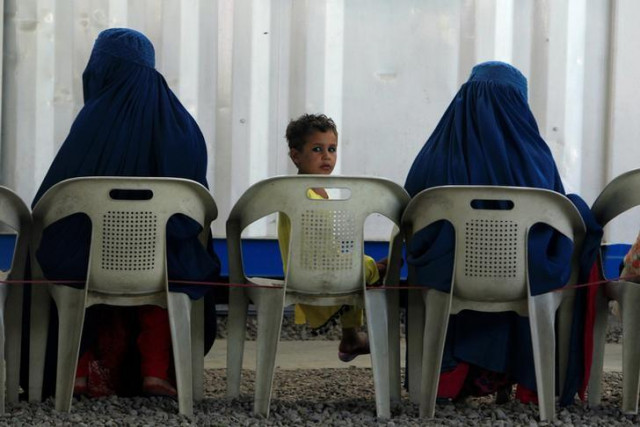Pakistan ranked 4th as refugee host country
World refugee population grows to nearly 80 million

Afghan refugees are seen at UNHCR’s Voluntary Repatriation Centre in Peshawar. PHOTO: REUTERS
The ‘Global Trends Report’ of the UN High Commissioner for Refugees (UNHCR), which has been released two days before World Refugee Day, said that forced displacement had almost doubled since 2010 and noted diminishing prospects for refugees when it came to hopes of a quick end to their plight.
“UNHCR has not seen a higher total,” UNHCR chief Filippo Grandi told a news conference in Geneva while announcing the report. “This is the highest figure that UNHCR has recorded since these statistics have been systematically collected and is a reason for great concern.
Over one per cent of humanity displaced: UN
“This is, by the way, approximately 1% of the world population. We’ve never reached this very significant percentage,” said Grandi, adding that 80% of the displaced people were in countries or territories affected by acute food insecurity and malnutrition … [and] facing climate and disaster risks.
Turkey hosted the highest number of refugees, 3.9 million, most of whom were Syrian refugees (92%). Colombia followed, hosting nearly 1.8 million displaced Venezuelans. Germany hosted the third-largest number, almost 1.5 million, with Syrian refugees (42%) Pakistan and Uganda are the 4th and 5th.
The figures highlight that at least 100 million people were forced to flee their homes in the past decade, seeking refuge either both in or outside their countries. That is more people fleeing than the entire population of Egypt, the world’s 14th most populous country.
The report noted that forced displacement has almost doubled since 2010 (41 million then against 79.5 million now). More than three-quarters of the world’s refugees (77%) are caught up in long-term displacement situations – such as the situation in Afghanistan is now in its fifth decade.
Further, more than eight of every 10 refugees (85%) are in developing countries, generally, a country neighbouring the one they fled. Five countries account for two-thirds of people displaced across borders: Syria, Venezuela, Afghanistan, South Sudan, and Myanmar.
“We are witnessing a changed reality in that forced displacement nowadays is not only vastly more widespread but is simply no longer a short-term and temporary phenomenon,” said Grandi. “People cannot be expected to live in a state of upheaval for years …”Lethal cocktail
Jan Egeland, Secretary General of the Norwegian Refugee Council described the report as a “damning verdict of unaccountable, impotent and nationalistic leadership around the world”. He urged the world’s rich nations to stop “building walls” to keep refugees out as middle-income countries were holding most of the refugees.
Egeland underlined that “during the 1990s genocides, we considered the 40 million people fleeing conflict and persecution the sign of a world falling apart”, adding: “Today that number has doubled – one in every 100 people worldwide has been forced to flee.”
He said warned that Covid-19 and conflict were a lethal cocktail. “Only real global cooperation will flatten the curve on these out-of-control displacement numbers, and end the suffering and the fertile ground for the pandemic.”



















COMMENTS
Comments are moderated and generally will be posted if they are on-topic and not abusive.
For more information, please see our Comments FAQ